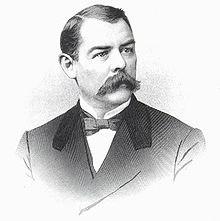Albion W. Tourgée
| Albion Winegar Tourgée | |
|---|---|
 |
|
| Born |
May 2, 1838 Williamsfield, Ohio |
| Died | May 21, 1905 (aged 67) |
| Nationality | United States |
| Alma mater | University of Rochester |
| Occupation | Jurist, Politician |
| Known for | Color-blind justice, founder of Bennett College |
Albion Winegar Tourgée (May 2, 1838 – May 21, 1905) was an American soldier, Radical Republican, lawyer, writer, politician, and diplomat. A pioneer civil rights activist, he founded the National Citizens' Rights Association, established the historically black women's college Bennett College, and litigated for the plaintiff Homer Plessy in the famous segregation case Plessy v. Ferguson (1896). Historian Mark Elliott credits Tourgée with introducing the metaphor of "color-blind justice" into legal discourse.
Born in rural Williamsfield, Ohio on May 2, 1838, Tourgée was the son of farmer Valentine Tourgée and Louisa Emma Winegar. His mother died when he was five. He attended common schools in Ashtabula County and in Lee, Massachusetts, where he spent two years living with an uncle. Tourgée entered the University of Rochester in 1859. Interestingly, he showed no interest in politics until the university attempted to ban the Wide Awakes, a paramilitary campaign organization affiliated with the Republican Party. Tourgée took on the administration and succeeded in reaching a compromise with the University president. Due to lack of funds, he left the university in 1861 without attaining a degree. He taught school as a way to raise money to return to Rochester, but with the outbreak of the Civil War, in April of the same year, he enlisted in the 27th New York Volunteer Infantry before completing his collegiate studies. As was common practice at many universities at that time, Tourgée was awarded an A.B. degree in absentia in June 1862.
Tourgée was wounded in the spine at the First Battle of Bull Run, the first major battle of the war, from which he suffered temporary paralysis and a permanent back problem that plagued him for the rest of his life. Upon recovering sufficiently to resume his military career, he was commissioned as a first lieutenant in the 105th Ohio Volunteer Infantry. At the Battle of Perryville, he was again wounded. On January 21, 1863, Tourgée was captured near Murfreesboro, Tennessee and was held as a prisoner-of-war in Libby Prison in Richmond, Virginia, before his exchange on May 8, 1863. He resumed his duties and fought at the battles of Chickamauga and Chattanooga. Under pressure from the military because of his medical condition, Tourgée resigned his commission on December 6, 1863 and returned to Ohio. He married Emma Doiska Kilbourne, his childhood sweetheart, with whom he had one child.
...
Wikipedia
